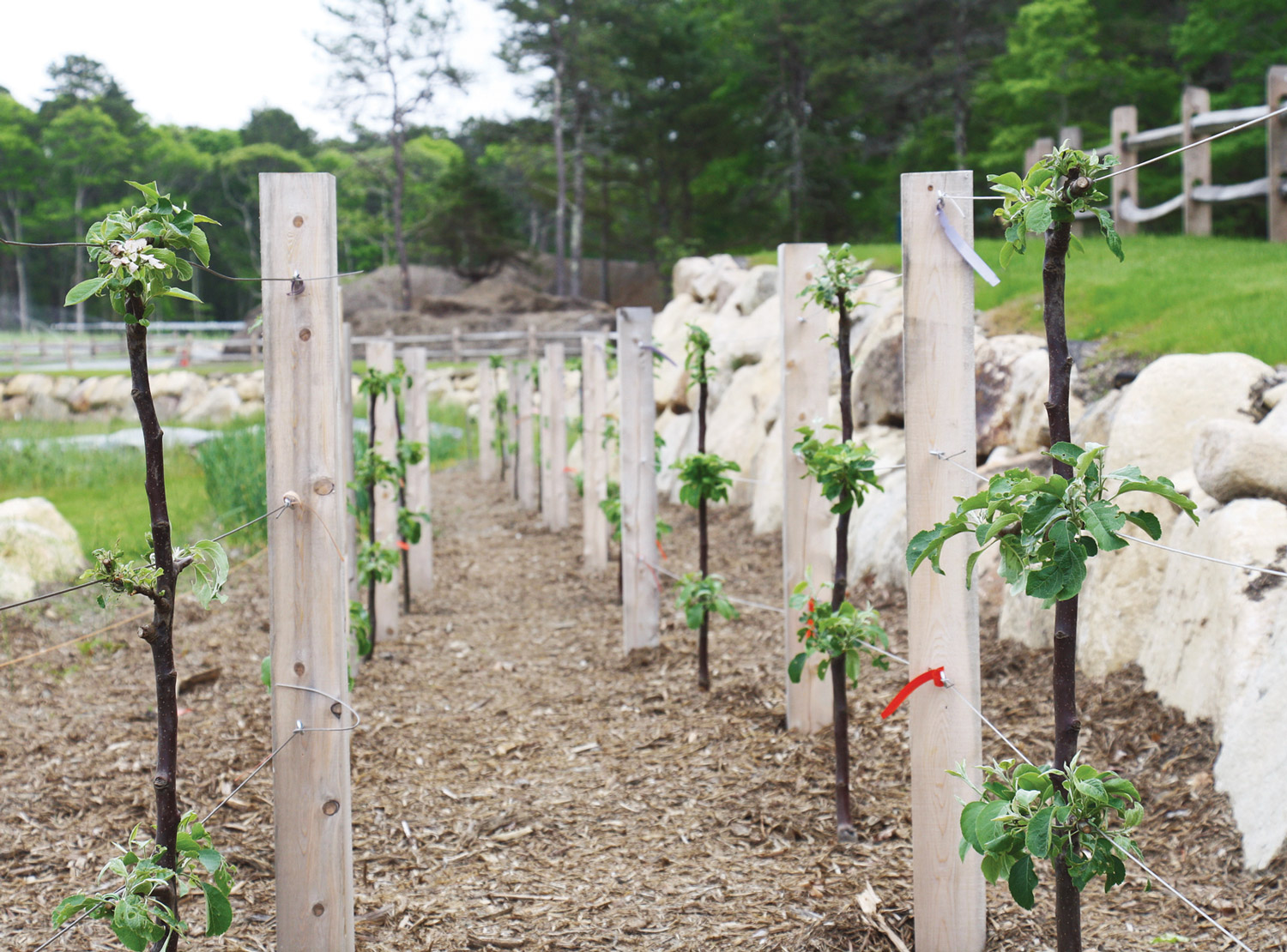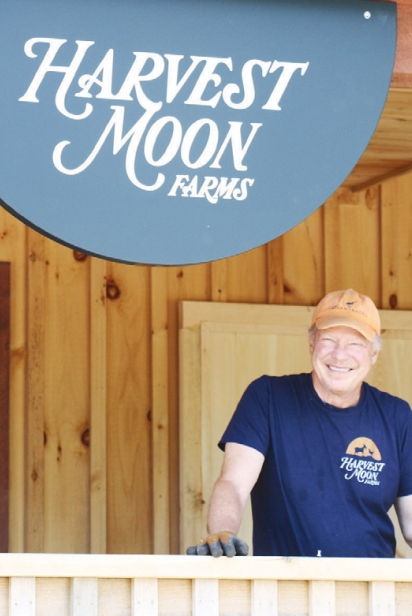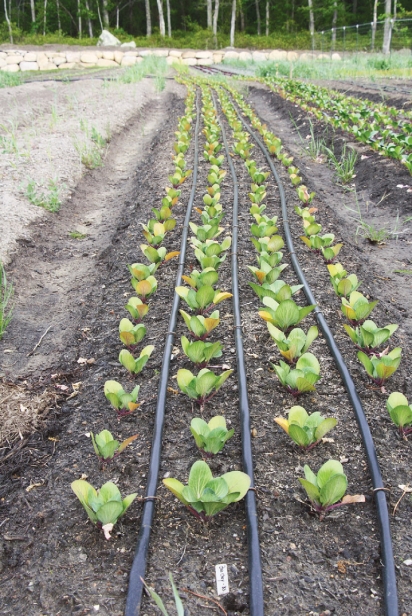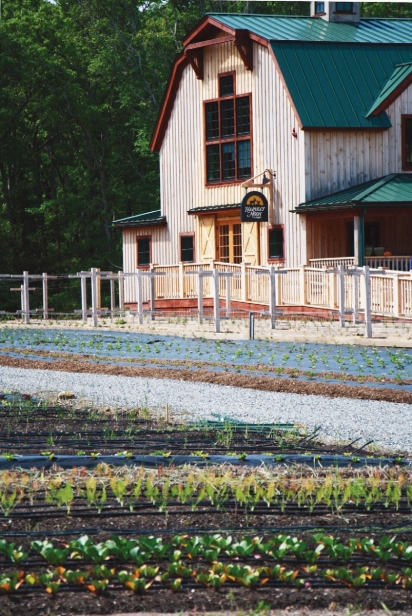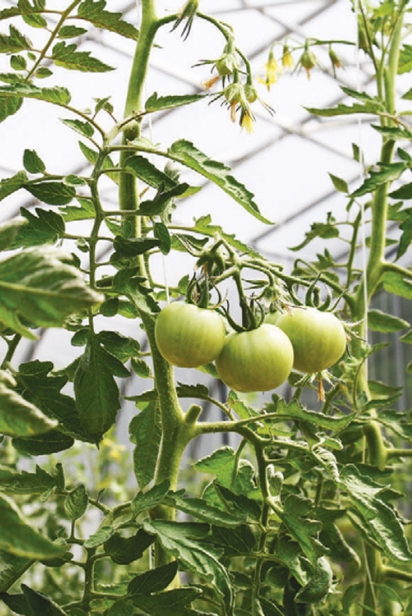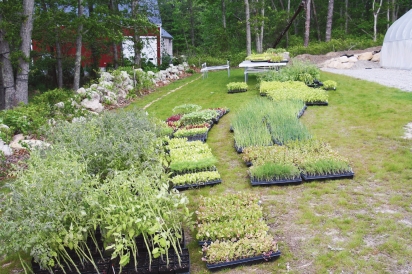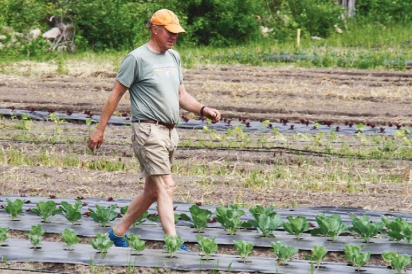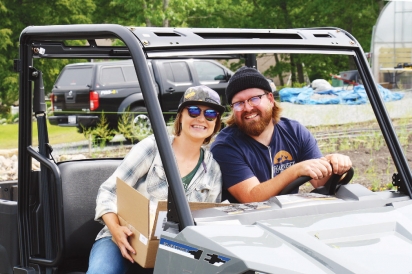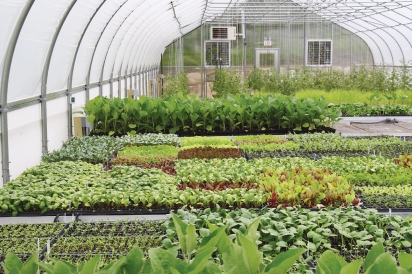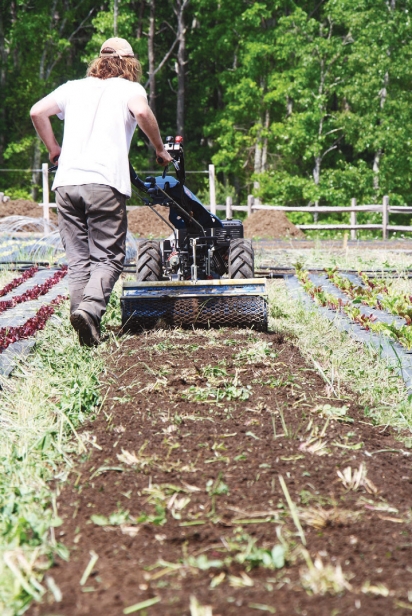Next Gen Farming: Harvest Moon Farms
The term “farm” conjures up familiar images. A lumbering tractor working slowly over the fields with a cloud of dust trailing in its wake. A weathered barn pockmarked by rot and critters supporting a swaybacked roof that seems to teeter on collapse. Rusted-out hulks of equipment long past functionality slowly being reclaimed by the land. These representations are nearly universal simply because the farms we think of are decades or centuries old. But what did these farms look like at the beginning of their lives when everything was fresh and new? The agricultural trend is not a pleasant one for small to mid-range farms. More and more local farms are disappearing and leaving only large-scale factory farms to supply us. Drive along the West Barnstable portion of Route 6A, and you’ll notice one endeavor that is growing against this sad grain, and that’s Harvest Moon Farms.
For nearly two years, Edwin Ordway and his wife Christine have been transforming the property, which once was a Christmas tree farm, and turning it into the area’s newest certified organic market farm. As opposed to a truck farm where produce is shipped to a distributor, a market farm features a farm stand on the property and allows the farmer to sell directly to the consumer. For Ed, this is the latest chapter of a life that has always been environmentally conscious. “I was a boy scout,” he explains “I’ve always had an interest in farming, but specifically sustainable organic farming.” While attending Rutgers University, Ed worked at a local produce and garden center. When he learned the owner was leasing a neighboring four acres to a farmer, he spoke up. “Why don’t we farm it?” he asked. His boss agreed and took the farming operations in-house.
Born and raised in northern New Jersey, Ordway and his family would spend their summer vacations on Cape Cod. With a family of his own, Ed continued to call the Cape his summer home; first in Chatham and now in Dennis. As an investment banker, Ordway worked with troubled companies such as Enron and Chrysler. He and his partners went on to start their own firm, but the time finally came to retire. Managing money apparently is a young person’s game. He explains, “Those people running around with the hedge funds are all twenty-seven, twenty-eight, twenty-nine years old,” He was ready to retire, but not stop.
“Retirement for me meant to do something different,” Ed says while sitting on the porch of the newly-constructed barn. The stunning post and beam structure will house the farm stand, offices, and storage for harvested crops. It will also be a place for Ed to hang his extensive collection of rock and roll memorabilia. Ordway named the operation after the hit song “Harvest Moon” by Neil Young. “I’ve seen him 60 times going back to the 1970s just after Nixon resigned,” he remembers proudly with a grin.
After a lengthy search, Ed found the perfect property to build his “something different.” The fifteen-acre parcel on the south side of Route 6A straddling the Barnstable and West Barnstable village line was ideal in both size and feel. Going up against some deep-pocketed competitors, he was able to purchase the property from an estate despite not being the highest bidder. “One was a single home developer, and another was a solar company looking to build a solar farm,” Ordway remembers. “I think the family liked what I was going to do, and they thought their father would be happy to know that his land was being used for an organic farm.”
Purchasing the land is merely a first step. Running the gauntlet of the regulatory process is something entirely different. More than a few developers’ dreams are dashed upon the rocky desks of the numerous departments of any town’s government. The planning board, zoning board of appeals, building department, and board of health are just some of the committees that need to sign off on a project before the first shovel bites into the ground. It can be a challenge, to say the least, and Ed’s experience with the town? “I can’t tell you how impressed I was with the municipality and how the municipality operates,” he beams. “I called up the powers that be regarding site plan approval, and they said, ‘we’ll get a meeting together with all the town officials and you tell us what you want to do, and we’ll all give you input so you’re mindful about that when you come back to present your plan.’” So, representatives from Barnstable’s various departments including health and fire departments sat down and shared with Ed areas of concern that would need to be addressed in his plan for the property. “They spent two hours with me!” he exclaims. The officials recognized that Harvest Moon Farms was going to be a beneficial addition to the town, and the approval came quickly. “We submitted our proposal in December of 2018, and we got the approval in January of 2019.” Ed remembers. Getting the authorization for the access road from the Massachusetts Department of Transportation was another matter entirely. “It took nine months to get approval from the state,” Ed sighs.
Getting certification as an organic farm is another challenge that Harvest Moon Farms needed to face, but it wasn’t as difficult as other properties find it to be. “This is all virgin soil,” he says, looking out over the fields from the second story balcony of the farm stand. “It’s more difficult for farms trying to become organic.” Indeed, many properties need to wait at least three years for the chemicals that had been previously used to leach through the soil and dissipate. “We’re starting from scratch here!” he adds.
With permits in hand, the arduous task of transforming the wooded property began in November of 2019. Seven and a half of the total fifteen acres would eventually be developed. Trees were removed and the topsoil was scraped off and screened to remove roots and rocks. “All these rocks,” Ed points to the hundreds of boulders used as retaining walls during a tour of the grounds, “all came from this property. We never had to truck in a single one.” The screened topsoil was mixed with compost and replaced to create two large fields. The north and south fields flank the central greenhouse where the seedlings get their start before going into the ground. Additional beds were built for strawberries, raspberries, and blackberries. Massive piles of root mulch and excess topsoil line the access road awaiting future use.
Perhaps it is the analytical mind of a retired investment banker at work because there is no detail overlooked. For a certified organic farm, creative alternative solutions are a must. Solar panels power equipment like the well pump that supplies the property with water, and drip irrigation lines were installed to water the crops. “It’s a much more efficient way to water,” Ordway says. “It only takes a half hour or so. Everything is on a computer-controlled timer.” Targeted irrigation saves a tremendous amount of water compared to raised sprinklers shooting out across the fields. Insect netting protects the lettuces from bugs, and bat and owl boxes to promote natural pest control methods are just a few non-chemical ways Harvest Moons Farms is waging its critter battle. For weed control, a propane torch is used to kill the weeds rather than applying a chemical that will remain in the soil long after the weeds are gone.
Harvest Moon Farms is a “no-till” farm. Tilling, or churning up the soil, not only releases the sequestered carbon dioxide from within, but it also brings up buried weed seed. Harvest Moon Farms plants a cover crop to protect the soil instead, and when the time comes to plant, black fabric is placed over the cover crops to kill them. A harrow is then used to scarify the surface of the soil and break up the remnants of the crops. A harrow is much less invasive than a tiller that digs deep into the earth. Tilling is needed to loosen the soil due to compaction from farm equipment and people. Ordway and his crew have a novel way to deal with that. The handlebars of the harrow swivel, which allows the operator to walk alongside between the beds and not on them.
In addition to the three acres divided between the north and south fields, there’s an additional three-quarters of an acre devoted to berries. In all, there will be nearly one hundred vegetables, fruits, and herbs available at Harvest Moon Farms. Leafy greens and lettuces total over twenty varieties alone. A small orchard of apple trees runs along the retaining walls that rim the north field. From garlic to gourds such as cantaloupe and watermelon, it is an impressive variety.
Pulling together such a large operation takes a lot of teamwork, and the Ordways have Emily Bush and Joshua Saylor to lean on when it comes to managing things. Emily and Josh have been working their way up through farming for the last decade. Learning of Ed’s plans while living in the Pacific Northwest, the two made the bold decision to pack up, move across the country and settle into the roles of farm managers with the eye of growing some roots of their own. The entire staff will number around ten when the peak of the season hits, and many hands are needed to pick, wash, and package up the produce orders as they are placed.
The rough timing estimates that one might find in the Old Farmer’s Almanac just won’t cut it when dealing with an operation of this scale. Technology continues to evolve life on the farm. Harvest Moon Farms employs the website tend.com to keep track of all aspects of the yearly growing cycle. The website was created with the market farm in mind, and assists in crop rotations, when to plant, how much to plant, spacing, when to harvest with additional tools to help in tracking sales.
As the madness of year one settles into a routine for year two and beyond, the Ordways will be expanding their offerings with the addition of goats. An area alongside the access road has been deliberately thinned of trees (with many remaining), and grasses will be introduced to create a silvopasture where the goats can graze. According to the USDA, silvopastures reduce heat stress in the animals which improves the well-being and output of the livestock. Chickens will be brought in for a steady supply of eggs and to fertilize the grass pathways that run throughout the property. The grass eventually will become part of the compost that will amend the soil of the growing plots. It’s this level of detail with which Harvest Moon Farms works that shows they are leaving no stone unturned when it comes to practicing sustainability (not that there are any stones left after being removed during the screening process).
“Neatness counts,” Ordway states as he walks the property with a purposeful stride that challenges a person to keep up with the 64-year-old. “I think people are more comfortable with purchasing their food when it and the property look good.” In addition to shopping in person, ordering can be done online through Harvest Moon Farms’ website for those who wish to be able to swing by, grab and go. Others may want to linger a bit and add to their online order as they peruse that day’s offerings when picking up. It’ll be hard not to dawdle just gazing at the splendid property, let alone shopping.
Equipment will eventually wear down. Crisp edges will round over, and the bright hues of fresh paint and cut lumber will bleach in the sun to take on its familiar weathered look. The bones, however, have been set for this next generation farm. The heart of it will beat on for generations to come. A farm is a noble use of land, and the life of a farmer is an honorable one. Laboring intensely to bring us sustenance. To do it with a sincere care and respect for the land which provides that nourishment, shows every hand on Harvest Moon Farms, from the top down, truly does have a heart of gold.
Along with being co-publisher of Edible Cape Cod with his wife Cori, Larry Egan is a New England Associated Press award-winning writer and commentator and host of the talk show The Handyman Hotline on Saturdays from 1-3 pm on 95.1 WXTK-FM. He can be found most afternoons on the trails of Cape Cod trying to wear out their Portuguese Water Dog puppy, Archie. He is not succeeding.
Harvest Moon Farms
2199 Main Street (Route 6A), Barnstable
(508) 744-7254
harvestmoonfarms.net


